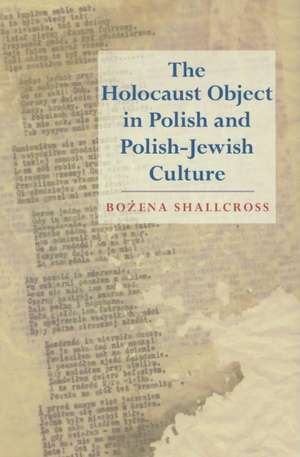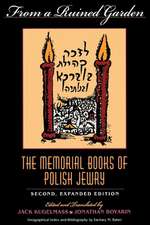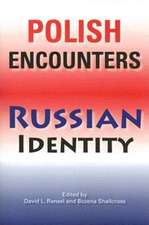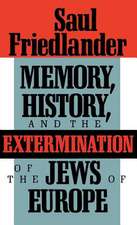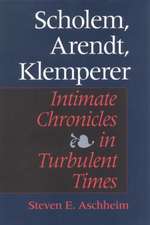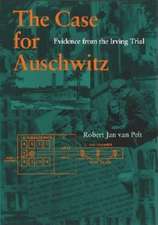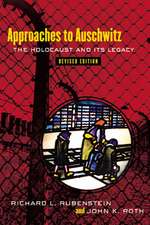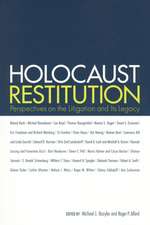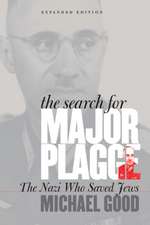The Holocaust Object in Polish and Polish-Jewish Culture
Autor Bozena Shallcrossen Limba Engleză Hardback – 20 feb 2011
Preț: 195.47 lei
Nou
Puncte Express: 293
Preț estimativ în valută:
37.41€ • 38.82$ • 31.27£
37.41€ • 38.82$ • 31.27£
Carte tipărită la comandă
Livrare economică 17-31 martie
Preluare comenzi: 021 569.72.76
Specificații
ISBN-13: 9780253355645
ISBN-10: 0253355648
Pagini: 181
Dimensiuni: 157 x 231 x 23 mm
Greutate: 0.44 kg
Editura: Indiana University Press
ISBN-10: 0253355648
Pagini: 181
Dimensiuni: 157 x 231 x 23 mm
Greutate: 0.44 kg
Editura: Indiana University Press
Cuprins
The Totalized Object: An IntroductionOn Jouissance: 1. A Dandy and Jewish Detritus; 2.The Material Letter JOn Waste and Matter: 3. A Holocaust Soap and the Story of its Production; 4. The Guilty Afterlife of the Soma On Contact: 5. The Manuscript Lost in Warsaw ; 6. Things, Touch and Attachment in AuschwitzCoda: Post-Holocaust ObjectsAcknowledgments and Permissions; Bibliography; Index
Recenzii
"Brilliant and ambitious . . . approaches [the] topic from a fresh and intellectually challenging perspective. . . . Shallcross's book is surely the most sophisticated analysis of Polish Holocaust literature ever written." Madeline G. Levine, University of North Carolina
"Shallcross has written an erudite book that provides novel insights into a broad range of themes, including memory, representation, ethics, the human senses, and Polish Jewish relations. From my perspective as a cultural historian of memory and of the Holocaust, I see her book making two key interdisciplinary contributions. First, Shallcross labors, in many ways, as a cultural historian as much as she does as a literary scholar. Her analysis of Polish and Polish Jewish responses to the Holocaust as it was taking place (or just shortly after it ended) vividly reconstructs the Nazi destruction of Polish Jewry and the distinct literary encounters with human violence that the Holocaust engendered. Her book marks a significant addition to the historiography of the Holocaust. Second, Shallcrosss work enriches our understanding of early Polish and Polish Jewish responses to the Holocaust. Analyzing Miloszs poem "A Poor Christian Looks at the Ghetto, she pauses to reflect on the significance of its creation: "To my knowledge, no non-Jewish author who lived under the terror of the Nazi rule would have signed an audacious poetic document of this caliber. - Michael Meng, H-Judaic, August 2012
"Shallcross has written an erudite book that provides novel insights into a broad range of themes, including memory, representation, ethics, the human senses, and Polish Jewish relations. From my perspective as a cultural historian of memory and of the Holocaust, I see her book making two key interdisciplinary contributions. First, Shallcross labors, in many ways, as a cultural historian as much as she does as a literary scholar. Her analysis of Polish and Polish Jewish responses to the Holocaust as it was taking place (or just shortly after it ended) vividly reconstructs the Nazi destruction of Polish Jewry and the distinct literary encounters with human violence that the Holocaust engendered. Her book marks a significant addition to the historiography of the Holocaust. Second, Shallcrosss work enriches our understanding of early Polish and Polish Jewish responses to the Holocaust. Analyzing Miloszs poem "A Poor Christian Looks at the Ghetto, she pauses to reflect on the significance of its creation: "To my knowledge, no non-Jewish author who lived under the terror of the Nazi rule would have signed an audacious poetic document of this caliber. - Michael Meng, H-Judaic, August 2012
Notă biografică
Böena Shallcross
Descriere
The vulnerability of material objects as Holocaust texts
